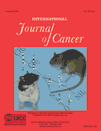Testicular germ cell tumors exhibit evidence of hormone dependence
Abstract
The aim of this investigation was to test the hypothesis that testicular germ cell tumors (TGCTs) are hormone-dependent cancers. Human TGCT cells were implanted in the left testis of male severe combined immunodeficient mice receiving either no treatment or hormone manipulation treatment [blockade of gonadotropin-releasing hormone secretion and/or signaling using leuprolide or leuprolide plus exogenous testosterone]. Real-time RT-PCR analysis was used to determine the expression profiles of hormone pathway-associated genes. Tumor burden was significantly smaller in mice receiving both leuprolide and testosterone. Real-time RT-PCR analysis of follicle-stimulating hormone (FSH) receptor, luteinizing hormone (LH) receptor and P450 aromatase revealed changes in expression in normal testis tissue related to presence of xenograft tumors and manipulation of hormone levels but a complete absence of expression of these genes in tumor cells themselves. This was confirmed in human specimens of TGCT. Reduced TGCT growth in vivo was associated with significant downregulation of LH receptor and P450 aromatase expression in normal testes. In conclusion, manipulation of hormone levels influenced the growth of TGCT in vivo, while the presence of xenografted tumors influenced the expression of hormone-related genes in otherwise untreated animals. Human TGCTs, both in the animal model and in clinical specimens, appear not to express receptors for FSH or LH. Similarly, expression of the P450 aromatase gene is absent in TGCTs. Impaired estrogen synthesis and/or signaling may be at least partly responsible for inhibition of TGCT growth in the animal model. © 2005 Wiley-Liss, Inc.




